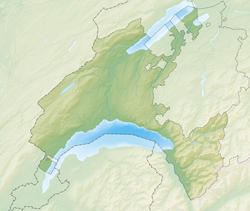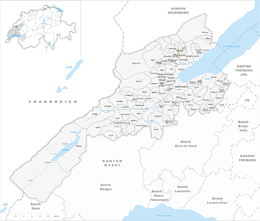Vaugondry
| Vaugondry | ||
|---|---|---|
| Former municipality of Switzerland | ||
|
||
| Coordinates: 46°50′N 6°38′E / 46.833°N 6.633°ECoordinates: 46°50′N 6°38′E / 46.833°N 6.633°E | ||
| Country | Switzerland | |
| Canton | Vaud | |
| District | Jura-Nord Vaudois | |
| Government | ||
| • Mayor | Frédy Duvoisin | |
| Area | ||
| • Total | 0.84 km2 (0.32 sq mi) | |
| Elevation | 729 m (2,392 ft) | |
| Population | ||
| • Total | 36 | |
| • Density | 43/km2 (110/sq mi) | |
| Postal code | 1423 | |
| SFOS number | 5569 | |
| Surrounded by | Champagne, Fontaines-sur-Grandson, Romairon, Villars-Burquin | |
| Website | Profile (French), SFSO statistics |
|
Vaugondry is a former municipality in the district of Jura-Nord Vaudois in the canton of Vaud in Switzerland.
The municipalities of Fontanezier, Romairon, Vaugondry and Villars-Burquin merged on 1 July 2011 into the new municipality of Tévenon.
Vaugondry has an area, as of 2009[update], of 0.84 square kilometers (0.32 sq mi). Of this area, 0.44 km2 (0.17 sq mi) or 52.4% is used for agricultural purposes, while 0.38 km2 (0.15 sq mi) or 45.2% is forested. Of the rest of the land, 0.02 km2 (4.9 acres) or 2.4% is settled (buildings or roads).
Of the built up area, housing and buildings made up 2.4% and transportation infrastructure made up 0.0%. Out of the forested land, 40.5% of the total land area is heavily forested and 4.8% is covered with orchards or small clusters of trees. Of the agricultural land, 14.3% is used for growing crops and 35.7% is pastures, while 2.4% is used for orchards or vine crops.
The municipality was part of the Grandson District until it was dissolved on 31 August 2006, and Vaugondry became part of the new district of Jura-Nord Vaudois.
The blazon of the municipal coat of arms is Gyrrony Or and Azure, overall a Cat effarouched stantant proper.
Vaugondry has a population (as of 2009[update]) of 36. As of 2008[update], 12.8% of the population are resident foreign nationals. Over the last 10 years (1999–2009 ) the population has changed at a rate of 9.1%. It has changed at a rate of -12.1% due to migration and at a rate of 21.2% due to births and deaths.
...
Wikipedia




